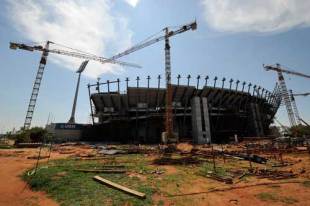|
1995
All eyes on Rustenburg
Huw Richards
May 29, 2009

The Royal Bafokeng Sports Palace will host the Lions this weekend
© Getty Images
Enlarge
The South African mining town of Rustenburg impinges on the consciousness of British rugby for the first time in 14 years this weekend when the Lions play their opening match there. It is the Scots among the travelling fans and media who are likeliest to find themselves retracing steps, since it was there that Scotland played their opening match in the 1995 World Cup. The Sunday Herald's Alastair Reid certainly remembers Rustenburg, having written of it as 'a two-horse town, assuming that it has acquired another horse since 1995'. No World Cup yet has left more indelible images. Take your pick from Jonah Lomu trampling Mike Catt, Rob Andrew's drop-goal, Durban's après-le-deluge semi-final or of course Nelson Mandela and Francois Pienaar in matching casual menswear. Rustenburg too left vivid memories. It hosted the Ivory Coast, perhaps the unlikeliest and least expected of all World Cup qualifiers. It was less than half a century since the first match had been played there, with a ball ingeniously knocked up from an old inner tube, and the Ivorian Rugby Federation was only five years old. Zimbabwe, who had played in 1987 and 1991, or Namibia - with their essentially South African rugby heritage - were the favourites, but the Ivorians squeezed past them both. They opened up at Olympic Park on the second day of the tournament, 26th May 1995, against Scotland. For half an hour they did reasonably well, with half-backs Frederic Dupont and Athanase Dali looking particularly useful. But then, perhaps prompted by the loss of Dali, their captain, the roof fell in. Scotland ran amok in the final stages before the break, then continued in the same vein during the second half. Props Paul Burnell and Peter Wright probably remember this particularly fondly, as they crossed for their only international tries, but the conspicuous contributor to a mortifying 89-0 final scoreline was Gavin Hastings. He scored four tries, nine conversions and - from the early period when the Ivorians were competitive - two penalties, a total of 44 points. It was the second time Hastings had broken the all-time record for points in an international. Eight years earlier, at the first World Cup, he had scored 27 against Zimbabwe at Dunedin. That record stood for a little under two hours before Didier Camberabero contributed 30 points to France's demolition of Romania. This time it seemed that Hastings' Bob Beamon-like leap forward, breaking the previous record by 14 points, must earn him a long stint in the record books. A week later Simon Culhane, making his All Black debut against Japan, scored 45 points. There were forebodings as to what France might do to the Ivorians four days later. But on 30th May - 14 years to the day before the Lions opener - they did rather better. Maybe a sense of familiarity helped. This was the first World Cup match between two French-speaking nations and many of the Ivorian players lived and played in France. The margin of defeat was a more modest 54-18, and the Ivorians scored two second-half tries through Ababacar Camara, Dali's stand-in at outside-half, and wing Aboubacar Soulama. It is, though, the third match against Tonga that has left the most lasting and painful Rustenburg memory. A few minutes into the match Max Brito, a young wing who had already made his mark with the committed ferocity of his tackling, challenged a Tongan. He went down hard. Rugby players are inured by experience to injuries. A broken bone will attract sympathy from team-mates, but there is a sense that it is an unavoidable part of the game. Just occasionally - Mervyn Davies's stroke in a Welsh semi-final, Glen Webbe suffering fits in a charity game at Old Deer Park - you see panic on the field, and know that it something different and much, much worse. Max Brito never has got up. He remains a quadriplegic, confined to a hospital bed in Bordeaux. A final Rustenburg memory was the insight into the singularity of Afrikaanerdom provided by the guttural accents of local fans shouting 'Come on Ivory Coast'. Rustenburg is Afrikaaner heartland. If the crazies who had wanted to perpetuate separatism in a 'Boerestaat' had got their way, it would have been well within its borders. Not many of those fans would have welcome an Ivorian rugby player if he had turned up on the doorstep wanting to date their daughter. But they were, at the same time, fellow Africans, and so attracted genuine warmth and support. Rustenburg has shown unexpected staying power as a major rugby venue with the Royal Bafokeng Sports Palace, the out-of-town successor to Olympia Park, staging a Tri-Nations test against New Zealand in 2006. Nor have the Ivorians gone away. After making only a limited impact in the last three World Cup qualifying tournaments, they've made it to the final four chasing the Africa slot at the 2011 World Cup and play Namibia home and away in the semi-finals in June. © Scrum.com
|
Live Sports
Communication error please reload the page.
-
Football
-
Cricket
-
Rugby
-
- Days
- Hrs
- Mins
- Secs
F1 - Abu Dhabi GP
Abu Dhabi Grand Prix December 11-131. Max Verstappen ()
2. Valtteri Bottas (Mercedes)
3. Lewis Hamilton (Mercedes)
4. Alexander Albon ()
5. Lando Norris ()
6. Carlos Sainz Jr ()
-
ESPNOtherLive >>
Golf - Houston Open
Snooker - China Open
Tennis - Miami Open

